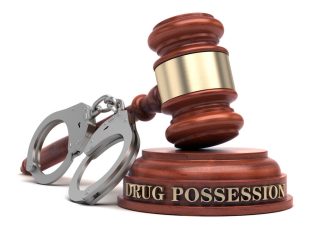There are a few main types of possession that can lead to drug charges in New Jersey. It is important to distinguish between them and understand how they impact your case.

Main Types of Drug Possession
In New Jersey, the illegal possession of drugs includes the possession, use, physical influence, and improper disposal of a controlled dangerous substance. With the realm of “possession,” there are three main types that can lead to drug possession charges being filed against you.
Actual Possession
A person charged with actual possession has been caught by New Jersey law enforcement in physical possession of controlled dangerous substances, for example, in their pocket or in their hand.
Constructive Possession
For constructive possession, which can occur for one person or several people, this type of offense holds that the defendant had knowledge of, and access to, an illegal substance, as well as some control over it, though they were not in immediate possession of the drugs. Like most drug possession offenses, it typically carries a felony charge in New Jersey. However, a constructive possession offense is more difficult to prosecute than an actual possession offense.
Joint Possession
Joint possession is very similar to constructive possession in New Jersey criminal law. Similar to constructive possession charges, a joint possession charge assumes that the defendant had knowledge that the drugs were present, that they were illegal, and that the defendant had some control over them. However, it occurs among two or more individuals. This often happens when law enforcement discovers drugs on the scene and they have reason to believe that each person had knowledge of the drugs as well as access to them and ability to control them. Multiple occupants of a vehicle is a prime example of this, as is a few people in a hotel room together or in a rented house at the Jersey Shore. We explore these types of situations in more detail below.
Fleeting Possession as a Defense in a Drug Possession Case
Fleeting possession is sometimes a strong defense in a New Jersey criminal drug possession case. While fleeting possession does involve the actual possession of drug, in fleeting possession, the defendant receives the illegal substance and upon recognizing what it is, immediately gets rid of it. Because such a series of events reflects the intention of the defendant to comply with New Jersey law, it can be a powerful defense for one charged with possession.
 Common Scenarios When Constructive Possession and Joint Possession Lead to Multiple Defendants in the Same Drug Possession Case
Common Scenarios When Constructive Possession and Joint Possession Lead to Multiple Defendants in the Same Drug Possession Case
As mentioned above, a common example of constructive possession is when law enforcement finds drugs in a car in which multiple people are riding. While no one is found in possession, the prosecution will attempt to prove the likelihood that those in the car had knowledge of the illegal substance and some control over it. A common scenario leading to a joint possession charge is one in which drugs are found in possession of one person while caught storing them in the locked space of another, such as a car trunk or closet. In such a case, it is reasonable to assume that the owner of the locked space had not only knowledge of the presence of the illegal substance on their property but had given consent for it to be placed there by the other. In both cases, multiple defendants will likely be charged with possession of drugs.
Let our Criminal Defense Lawyers Help if You Have been Charged with Drug Possession Offense in Monmouth County NJ
A drug possession charge in New Jersey is a nuanced charge that requires an individualized defense approach based on the allegations, evidence, and details of the case. There are multiple ways that a skilled criminal defense attorney can develop a solid defense to reduce or even successfully eliminate your charge through legal arguments in court. Our team of criminal defense lawyers at Chamlin, Uliano & Walsh represents clients facing drug charges in Colts Neck, Lavallette, Middletown, Asbury Park, Freehold, Long Branch, Red Bank, and other towns in Monmouth County NJ, to make sure that their rights are protected and their best interests served. We have a long record of success investigating our clients’ charges, building a strong defense that removes culpability, helps them gain admission into a program like Conditional Discharge, Pretrial Intervention, or Drug Court, or reaches a plea deal with prosecutors to reduce their sentence as much as possible.
Contact us at 732-440-3950 or toll-free at 888-328-9131 to schedule a confidential consultation regarding your drug possession case. When you need experience and trusted advice of counsel in a criminal case, we have these qualifications in spades.

 Common Scenarios When Constructive Possession and Joint Possession Lead to Multiple Defendants in the Same Drug Possession Case
Common Scenarios When Constructive Possession and Joint Possession Lead to Multiple Defendants in the Same Drug Possession Case